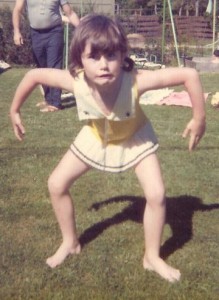The birds, and the heartbreak: 2 or 3 questions for Kerrin McCadden
Kerrin McCadden, whose poems "The Domino's Pizza Gorilla" and "The Death of the Reader" are live now on our site, is not an ornithologist. And yet—
***

Much of the charm of your poems comes from your use of plain language, and the ease with which you tell a story, working your way slyly, slowly to its emotional heart. Also the constant references to birds. Yet in "Domino's"—no birds. You tease us, there, toward the end, where you mention heavy maple branches creaking—as though under the weight of large birds. And yet. Were there birds in there, at one point?
No, there never were birds in this poem. There was that kind of nighttime heavy summer wind that makes big trees creak. I don’t know where the birds go when the wind is wild like that. I think birds have always shown up because they represent something flitting and unreachable. In poems, I’m often attracted to creating language that is somewhat workmanlike—simple declarative sentences that spin outward. This is a heavy move, I think. If I have a heavy move, I also want lightness. I want something that can’t be held down by this kind of language. I want something that moves behind it, in front of it, despite it. This time, it was a gorilla. In a way , she is light. She defies the poem.
"The Death of the Reader" starts, in a sense, as a paean to fiction. But in the end it comes down on the side of the poem, and its ability to "break your heart in the short term." Does the reader of the "Reader" move back and forth between these genres? And do you, and if so, what, as a writer, do you take from each?
Oh this poem comes down hard on the side of the poem. More than anything, this is a poem about divorce—and this may be my one divorce poem, which is, in itself, a love poem. Once the heart is broken in that way—the total dissolution of a marriage, whether desired or not, it seeks other ways to be broken. Novels are another heavy heartbreak. Poems are quick, sharp heartbreaks. We tend to define heartbreak as something ugly, but, really, it can be such a crisp, rich thing.
What is really true about this poem is that after my divorce, I became unable to finish novels. I would read them, and love them utterly. Something in me would not let them end. I have a stack of novels I can say I loved, but they sit unfinished—and frozen in my mind at the places I loved them completely, or where they broke my heart utterly. I let them end. I’m sure there are all sorts of ways to psychoanalyze this—in fact they are all rushing into my head at once right now. Novels catch my breath. Not in their entirety, but moments of them. When I remember a book, I remember the scenes that stopped my heart—the poems, if you will, contained in them. I don’t mean I have no capacity for heartbreak. I love a perfect heartbreak. This is why I love poems.

